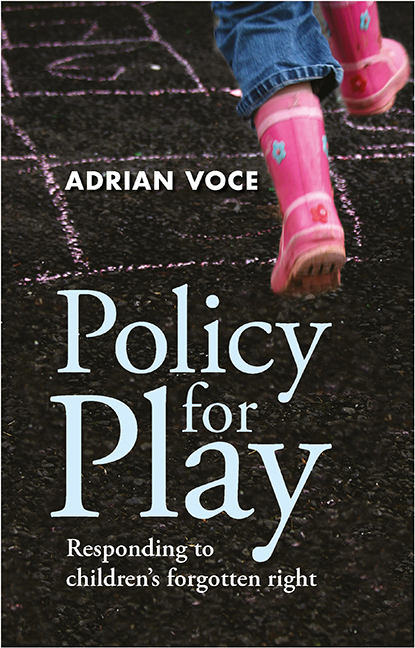Book contents
- Frontmatter
- Dedication
- Contents
- Who’s who
- About the author
- Preface
- Foreword
- Prologue
- Introduction ‘To respect, protect and fulfil’
- one ‘To play and to dream’ • Restoring play to the heart of the campaign for children’s rights
- two ‘For a change’ • Finding the evidence for play policy
- three ‘Advocates for play’ • Playwork’s place at the heart of the play movement
- four ‘New opportunities’ • Lottery funding and the beginnings of public play policy
- five ‘A vital and vibrant city’ • How devolved government in London set a benchmark for play policy
- six ‘Making the case’ • The call for a national play strategy
- seven ‘Things to do, places to go?’ • How play was overlooked by children’s services reform
- eight ‘Getting serious’ • The national play review
- nine ‘Lottery millions’ • The Children’s Play Initiative
- ten ‘Dirt is good’ • The Play England project
- eleven ‘The best place in the world’ • The Play Strategy for England
- twelve ‘Playbuilders’ • Breaking the mould of the public playground
- thirteen ‘Everyday adventures?’ • Austerity brings an end to play policy in England
- fourteen ‘Skylarks and canaries’ • The legacy of the Play Strategy
- fifteen ‘Children now’ • Responding to children’s right to play: conclusions and recommendations
- Epilogue
- References
- Index
four - ‘New opportunities’ • Lottery funding and the beginnings of public play policy
Published online by Cambridge University Press: 08 March 2022
- Frontmatter
- Dedication
- Contents
- Who’s who
- About the author
- Preface
- Foreword
- Prologue
- Introduction ‘To respect, protect and fulfil’
- one ‘To play and to dream’ • Restoring play to the heart of the campaign for children’s rights
- two ‘For a change’ • Finding the evidence for play policy
- three ‘Advocates for play’ • Playwork’s place at the heart of the play movement
- four ‘New opportunities’ • Lottery funding and the beginnings of public play policy
- five ‘A vital and vibrant city’ • How devolved government in London set a benchmark for play policy
- six ‘Making the case’ • The call for a national play strategy
- seven ‘Things to do, places to go?’ • How play was overlooked by children’s services reform
- eight ‘Getting serious’ • The national play review
- nine ‘Lottery millions’ • The Children’s Play Initiative
- ten ‘Dirt is good’ • The Play England project
- eleven ‘The best place in the world’ • The Play Strategy for England
- twelve ‘Playbuilders’ • Breaking the mould of the public playground
- thirteen ‘Everyday adventures?’ • Austerity brings an end to play policy in England
- fourteen ‘Skylarks and canaries’ • The legacy of the Play Strategy
- fifteen ‘Children now’ • Responding to children’s right to play: conclusions and recommendations
- Epilogue
- References
- Index
Summary
When John Major made an election pledge (Conservative Party, 1992) to create a new National Lottery to raise money for good causes, he ‘knew it was the only way we could fund a rebirth of cultural and sporting life in Britain’ (Major, 1999). Children’s culture is found in their play – indeed, it can be said that, in a sense, playing is children’s culture (Fagen, 2005) – and so it is perhaps no surprise that this new way of raising public money was to have such a big role in the policy breakthroughs that were eventually to lead to a national play strategy.
Major was the Conservative Prime Minister with the unenviable task of succeeding Margaret Thatcher in 1990. Installed without a popular vote after an internal party coup against a national icon, and commonly caricatured as lacking the charisma and conviction that had been the hallmarks of his predecessor, Major was not expected to win the 1992 election against a resurgent Labour Party.
Under the leadership of the skilled and dynamic Welsh orator, Neil Kinnock, Labour had largely purged itself of the more radical elements of the party, such as the militant tendency (New Statesman, 2010), which had been blamed for keeping it from office during the 1980s. It was doing consistently well in opinion polls and was widely predicted to win (Crewe, 1993). However, after a campaign in which Major had cleverly played to the strengths of his everyman image – famously taking his arguments directly to the people by literally standing on a soapbox in town squares up and down the country – the Conservatives won a record fourth consecutive general election. That this time they did so not with the talismanic leader who had redefined her party and transformed the political and economic landscape of her country (even as she was dividing it) but with the diffident, somewhat nerdish Major, only underlined the extent to which the political centre of gravity had shifted to the right: a fact not lost on the pre-eminent young Labour modernisers, Tony Blair and Gordon Brown.
Like Thatcher, the perennial Conservative divisions would plague John Major over its relationship with the European Economic Community (EEC), as it was then.
- Type
- Chapter
- Information
- Policy for PlayResponding to Children's Forgotten Right, pp. 45 - 50Publisher: Bristol University PressPrint publication year: 2015



